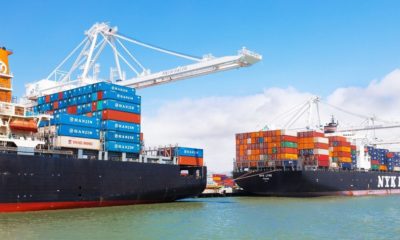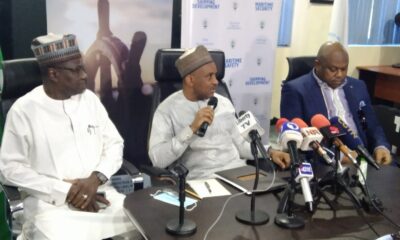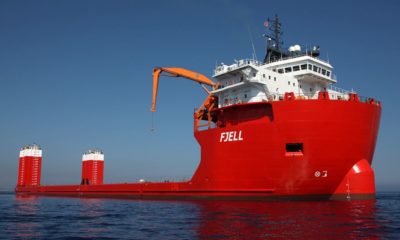- Israeli Firm Commences $195m Maritime Security Contract
The Minister of Transportation, Mr Rotimi Amaechi, has disclosed that the maritime security contract entered into by the Federal Government and an Israeli firm, Messrs HLSI Security Systems and Technologies had already commenced and was ongoing.
The minister stated this during the unveiling of the 2019/2020 Maritime Industry Forecast by the Nigerian Maritime Administration and Safety Agency in Lagos on Tuesday.
The $195m maritime security contract was signed off by the Federal Executive Council in December 2017 and was for the provision of three helicopters, three airplanes, three big battle-ready ships, 12 vessels and 20 amphibious cars, to aid security of Nigeria’s waterways.
In January 2018, the House of Representatives criticised the management of NIMASA for awarding the contract to HLSI, saying it was a breach of Nigeria’s internal security and defiance of the local content law.
President Muhammadu Buhari had in May 2018, cancelled the contract via a memo directing the Attorney General of the Federation, Abubakar Malami, to terminate the contract and for the National Security Adviser and the Nigerian Intelligence Agency to investigate how the contractor obtained security clearance without an end-user certificate.
Buhari also ordered HLSI to supply equipment to the tune of the $50m upfront payment it received from Nigeria.
The Federal Government, however, reinstated the contract in August, according to NIMASA.
Speaking through the Deputy Director, Cabotage and Shipping Development in the ministry, Mrs Gloria Adie-Ayabie, the minister disclosed that President Buhari had put in place many reforms in the maritime industry to promote the safety and security of Nigeria’s waterways, for the benefit of Nigerian citizens and investors.
He said although the sector was faced with various forms of criminality ranging from armed robbery, oil theft, piracy and other forms of unreported crimes, government was making efforts to tame these criminal activities, through the presentation of an executive bill at the National Assembly for an Act to provide for the suppression of piracy and other unlawful acts at sea.
He said, “In addition, the Federal Government has signed an agreement with Messrs HLSI to establish and integrate national security and water protection infrastructure in Nigeria, to ensure security in the national maritime domain, the execution of which is ongoing.”
Pirate attacks in the Gulf of Guinea have been on the increase in recent times. Last year, Nigeria recorded 30 pirate attacks on ships, the highest number of attacks recorded in the nations around the GoG, according to data from the International Maritime Bureau.
Speaking on the sideline of the event, the Director- General, NIMASA, Dr Dakuku Peterside, said if piracy was not tackled, Nigeria would not be seen to be serious about growing the local maritime sector.
“We are very determined to address the issues of piracy and maritime crimes. We are taking very solid steps in terms of providing the right legal framework, acquisition of assets, building the necessary partnership and coalition to fight piracy.
“I believe we are going to achieve a lot of results this year,” he said.
Speaking further, Peterside noted that the 2019/2020 maritime industry forecast dwelt on past trends and the current opportunities for Nigeria in the maritime sector.
He expressed optimism that there would be more demand for Nigeria’s oil and gas along with demand for shipping and allied services this year and the next.
He said Nigeria was equally positioning itself to take advantage of the opportunities by acquiring the necessary assets and growing human capacity.
He said, “At the global level, we look at four key items, the demand for oil and gas, the demand for commodity at expanded level, the trade war between China and the United States.
“We also look at the global economy which is shrinking and will affect the local economy and the revenue that is due to us.
“We have looked at the domestic economy and the impact of the general elections. If the elections end in favour of the incumbent, there will be some consistency in policy, if the elections favour the opponent, there will be a new shift in terms of policy. If they end in deadlock, it will be a challenge.”
He said the forecast also considered the opportunities available in terms of tankers, container vessels, offshore support vessels and other cabotage operations.
It looked at the regulatory challenges such as the effect of the early passage of the anti-piracy bill and the effect of signing into law, the Petroleum Industry bill.
“We have looked at all these factors and backed by statistics or data, we are able to situate what the future is most likely to look like.
“There will be general upward movement in terms of demand for shipping services. There will also be an increase in oil support services, and offshore services.
“More indigenous operators will be operating in the sector.”

 Billionaire Watch3 weeks ago
Billionaire Watch3 weeks ago
 Startups4 weeks ago
Startups4 weeks ago
 News4 weeks ago
News4 weeks ago
 News4 weeks ago
News4 weeks ago
 Bitcoin4 weeks ago
Bitcoin4 weeks ago
 Naira4 weeks ago
Naira4 weeks ago
 Forex3 weeks ago
Forex3 weeks ago
 Treasury Bills4 weeks ago
Treasury Bills4 weeks ago





















